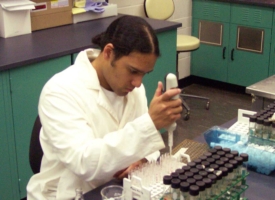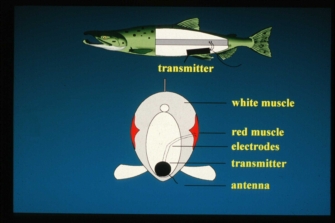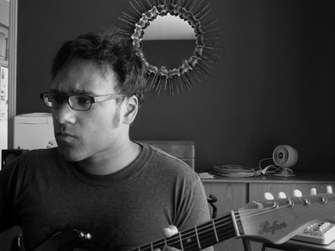AQUACULTURE STUDENT

KRIS CHANDROO
What They Did Back Then
* Master of Science completed 2000, University of Guelph
Advisors: Professor Richard D. Moccia and Dr. J.F. Leatherland
Assessing the welfare status of farmed rainbow trout ( Oncorhynchus mykiss) with electromyogram telemetry
Kristopher attained his Masters degree in 2000 under the guidance of Professor Richard Moccia, and Dr.'s Ian Duncan, John Leatherland, and R.S. McKinley. His thesis entitled “Assessing the Welfare Status of Rainbow Trout with Electromyogram Telemetry” was focused on determining the use of radio signals derived from muscle activity to assess the behaviour of fish in aquacultural environments. An additional objective of his research was to interpret the behaviour of farmed fish in terms of their welfare state. Kristopher determined that stocking density (Cooke, Chandroo, Beddow, Moccia, & McKinley 2000), transportation (Chandroo, Cooke, McKinley & Moccia 2005), and the type of lighting installed in artificial rearing environments (Chandroo, Moccia, & McKinley 2000) all affected certain behaviours of fish, and that these behaviours were correlated to physiological stressors not previously accounted for in aquacultural environments.
ABSTRACT
Fish are sentient animals that may experience stress, fear and pain. It is therefore appropriate to recognize and study the welfare of farmed fish. The utility of electromyogram telemetry (EMT) for assessing the physiological and behavioural responses of rainbow trout to various aquacultural rearing environments was investigated. Video observations of the ‘startle response’ of rainbow trout, induced by ‘instant-on’ lighting, were analyzed and could be correlated with EMT signals, indicating that telemetry data were an accurate measure of swimming activity. EMT signals from fish monitored during a transportation episode indicated that vigorous swimming was induced, and subsided during a post-transportation resting period. Both ‘instant on’ and ‘natural, phased-in’ artificial lighting regimens affected the behaviour of rainbow trout, as evaluated by EMT data. When interpreted within an appropriate context, the information obtained by EMT, in combination with other biological indicators, may be used to evaluate the welfare status of farmed fish.
Where They Are Now
In the late nineties, the "well being" of fish was mostly discussed in reference to levels of physiological stress, growth and mortality rates. However, it became apparent early on in Kristopher's studies, that to truly understand the meaning of "good welfare", for an animal so evolutionary divergent from mammals, that we first had to understand the "welfare status of fish". As animal welfare is primarily concerned with the quality of life of a conscious organism, the question of whether fishes were even capable of consciousness had to be addressed. The flexible and creative environment provided by Kristopher’s graduate committee allowed him to further expand the work, sparking new questions, insights and studies into the ability for conscious cognition and pain perception in fish. After graduation, Kristopher was contracted by the Aquaculture Centre at the University of Guelph, where he continued to develop his work examining the evolution of conscious traits in early vertebrates, with application to the question of pain perception in fish. In Chandroo, Yue, and Moccia (2004), Kristopher suggested that an accurate assessment of the mental capacity of fishes required enhanced knowledge of their forebrain neuroanatomy, an understanding of how such structures mediate behavioural responses, and an analysis of that information within the context of contemporary theory related to the evolution of consciousness in higher vertebrates. In Chandroo, Moccia and Duncan (2004), Kristopher determined that anatomical, pharmacological and behavioural data suggested that states of pain, fear and stress could be rationally argued as being experienced by fish in similar ways as in mammals and other tetrapods.
In 2001, Kristopher entered the Doctor of Veterinary Medicine Program at the University of Guelph. As a veterinary student, he designed and organized an original study examining fish cognition. In 2002, Kristopher received the Humane Society of the United States student travel award, and he was able to present and discuss his pain research at the ISAE International Congress in the Netherlands. During the DVM program, Kristopher pursued freelance animal welfare assessment contracts, and was able to speak at several conferences across Canada. He was also fortunate to compete for the University of Guelph Gryphon cross country varsity team during his veterinary training. After graduating from the DVM program in 2005, Kristopher relocated to Vancouver Island, and helped to establish a new veterinary practise.
Just recently, Kristopher has re-located to Ottawa where he is continuing to practise veterinary medicine. In addition, he has been able to utilize his previous training in critical analyses of pain perception, and his veterinary clinical skills, in order to advocate for modern, evidenced based treatments for human patients suffering from Complex Regional Pain Syndrome. His arguments have recently resulted in several provincial governments’ allowing access for patients to new treatment protocols required to manage and reduce pain associated with this debilitating and life threating condition (www.rsdfoundation.org).
Kristopher is also the producer, guitarist, mix engineer, and along with Dareck Gorecki, is a founding member of "The Last Night of Your Life" (www.myspace.com/thelastnightofyourlife). He is releasing his new album "For you only" in April of 2009. His latest pursuits can be summed up in one song - "the plan" (www.drop.io/thelastnightofyourlife).
Related Links:
www.myspace.com/thelastnightofyourlife
www.drop.io/thelastnightofyourlife
Schematic showing transmitter placement

Kris the guitarist.
